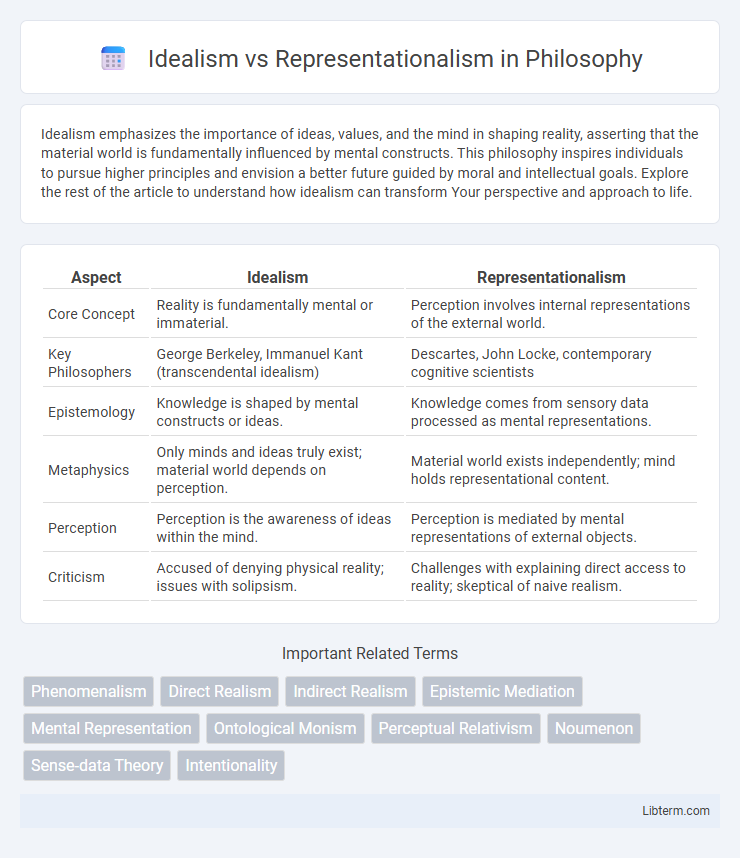Idealism emphasizes the importance of ideas, values, and the mind in shaping reality, asserting that the material world is fundamentally influenced by mental constructs. This philosophy inspires individuals to pursue higher principles and envision a better future guided by moral and intellectual goals. Explore the rest of the article to understand how idealism can transform Your perspective and approach to life.
Table of Comparison
| Aspect | Idealism | Representationalism |
|---|---|---|
| Core Concept | Reality is fundamentally mental or immaterial. | Perception involves internal representations of the external world. |
| Key Philosophers | George Berkeley, Immanuel Kant (transcendental idealism) | Descartes, John Locke, contemporary cognitive scientists |
| Epistemology | Knowledge is shaped by mental constructs or ideas. | Knowledge comes from sensory data processed as mental representations. |
| Metaphysics | Only minds and ideas truly exist; material world depends on perception. | Material world exists independently; mind holds representational content. |
| Perception | Perception is the awareness of ideas within the mind. | Perception is mediated by mental representations of external objects. |
| Criticism | Accused of denying physical reality; issues with solipsism. | Challenges with explaining direct access to reality; skeptical of naive realism. |
Introduction to Idealism and Representationalism
Idealism posits that reality is fundamentally mental, with objects existing only as perceptions within the mind, emphasizing consciousness as the basis of all existence. Representationalism asserts that the external world exists independently but is only accessible through mental representations or sensory inputs, highlighting the mediation between reality and perception. Both philosophical perspectives explore the nature of knowledge and the relationship between mind and world, shaping epistemological debates on how humans understand reality.
Historical Origins and Philosophical Context
Idealism, rooted in the works of Plato and later developed by German philosophers like Kant and Hegel, posits that reality is fundamentally mental or immaterial. Representationalism, emerging prominently in early modern philosophy through Descartes and Locke, argues that the mind perceives the external world indirectly via mental representations or ideas. These philosophical frameworks arose from debates on the nature of perception, consciousness, and the relationship between mind and reality during the Enlightenment and preceding periods.
Core Tenets of Idealism
Idealism asserts that reality is fundamentally mental, positing that objects only exist as perceptions in the mind rather than possessing an independent material substance. This philosophical stance emphasizes that consciousness shapes and constitutes reality, rejecting the existence of a mind-independent world. Key proponents like George Berkeley argue that all entities are either minds or ideas within minds, making perception central to the existence of everything experienced.
Fundamental Principles of Representationalism
Representationalism asserts that perception involves mental representations or internal images that mediate our understanding of the external world, emphasizing a clear distinction between the mind and reality. It holds that individuals do not perceive objects directly; instead, they experience mental constructs formed by sensory input processed by the brain. This foundational principle contrasts with Idealism, which suggests that reality is fundamentally shaped or dependent on the mind.
Key Differences Between Idealism and Representationalism
Idealism asserts that reality is fundamentally mental or immaterial, positing that objects only exist as perceptions within the mind, while representationalism maintains that the external world exists independently and our minds hold mental representations of these objects. Idealism emphasizes the primacy of subjective experience, asserting that the material world is dependent on consciousness, whereas representationalism differentiates between the mind and the world, holding that perception involves internal representations of an objective reality. Key differences lie in their ontological commitments: idealism denies independent material existence, while representationalism accepts an external reality mediated by mental representations.
Major Philosophers and Their Contributions
George Berkeley, a key proponent of Idealism, argued that reality consists solely of minds and their ideas, asserting that objects exist only through perception. Immanuel Kant significantly shaped Representationalism by proposing that humans do not access things-in-themselves but only their representations filtered through innate cognitive structures. Rene Descartes' dualism laid groundwork for Representationalism by emphasizing the separation between mind and external world, influencing later debates on how perceptions relate to reality.
Epistemological Implications
Idealism asserts that reality is fundamentally mental, positing that knowledge is directly linked to the mind's perceptions and ideas, challenging the notion of an independent external world. Representationalism maintains that knowledge is mediated through mental representations or sensory data, highlighting potential limitations in accessing objective reality. Epistemologically, idealism suggests the inseparability of the knower and the known, while representationalism emphasizes a possible epistemic gap between perception and the external world.
Critiques and Counterarguments
Idealism faces critiques for its tendency to blur the line between perception and reality, often accused of solipsism or denying an external world independent of the mind. Representationalism is challenged for positing a mental representation between the external world and perception, which can lead to infinite regress or skepticism about the accuracy of these representations. Counterarguments for idealism emphasize the inseparability of perception and existence, while defenders of representationalism argue that internal representations are necessary for cognitive processing and experiential consistency.
Contemporary Relevance and Applications
Idealism emphasizes the primacy of mind and ideas in shaping reality, influencing contemporary debates in metaphysics and cognitive science about the nature of consciousness and perception. Representationalism posits that the mind perceives the external world through internal representations, underpinning modern theories in neuroscience, artificial intelligence, and virtual reality development. These philosophical perspectives directly impact advancements in immersive technologies and debates on the reliability of sensory data in digital environments.
Conclusion: Synthesizing Perspectives
Idealism posits that reality is fundamentally mental, while representationalism holds that our perceptions are internal representations of an external world. Synthesizing these views reveals that conscious experience both constructs and interprets reality, bridging subjective phenomena with objective representation. This integrated perspective advances understanding of the mind-world relationship by accounting for the interplay between mental constructs and external reality.
Idealism Infographic

 libterm.com
libterm.com